Life on the Run (16 page)
Authors: Stan Eldon
Tags: #Running, #long distance, #cross-country, #athletics, #international races, #police, #constable, #half marathon, #Disability Sport, #autobiography, #memoirs, #biography, #life story

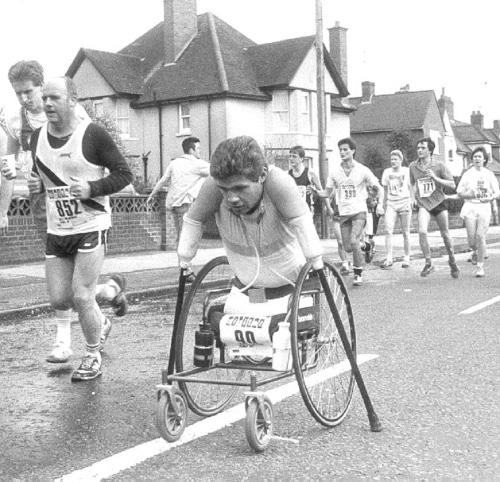
Peter Hull, the man that inspired thousands
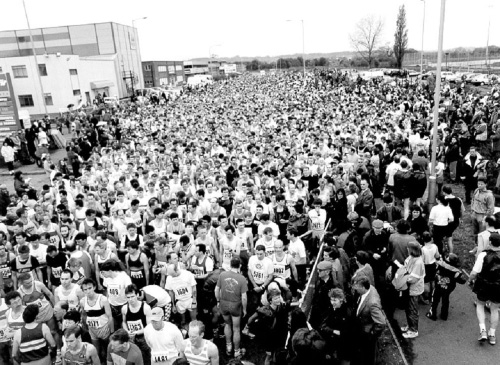
Waiting for the start of one of the smaller entries to the Reading Half Marathon

The epic dead heat finish of Reading Half Marathon in 1990
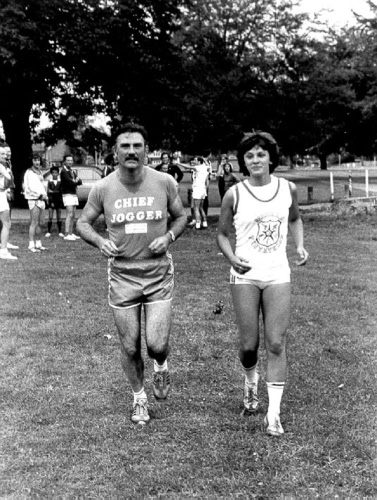
The âChief Jogger' with Kathy Tayler at one of the early jogging events held in Prospect Park, Reading
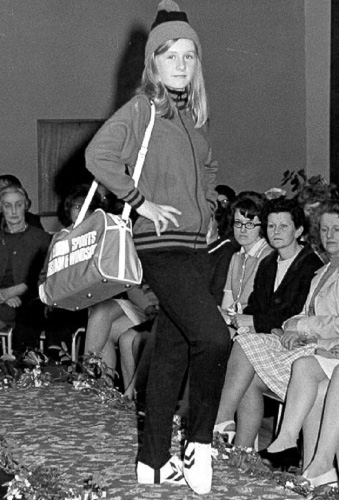
A Stan Eldon Sports Fashion Show - daughter Caroline modelling
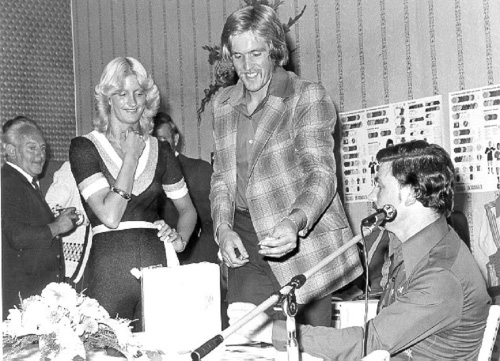
Another job for Stan, compere at the Fashion Show with goalkeeper Phil Parkes and athlete Donna Murray (Hartley)
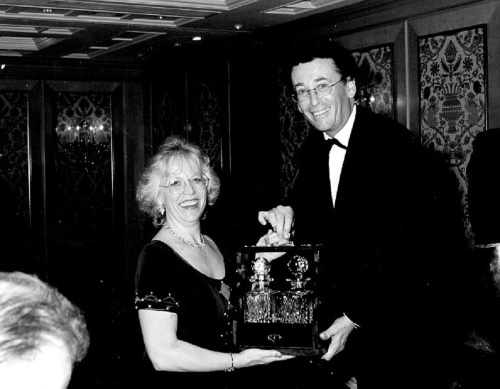
Actor Robert Powell, a great supporter of SportsAid at one of the fund raising dinners at the Royal Lancaster
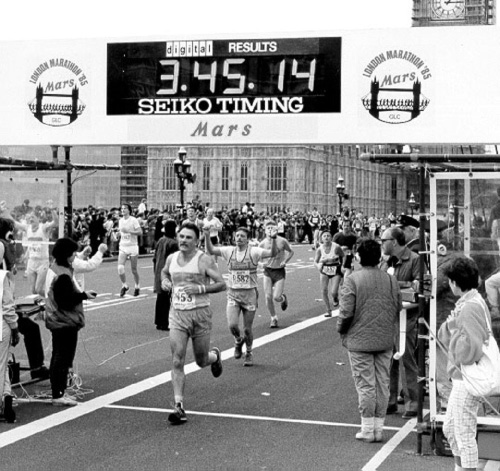
The agony and ecstasy of the London Marathon in 1985
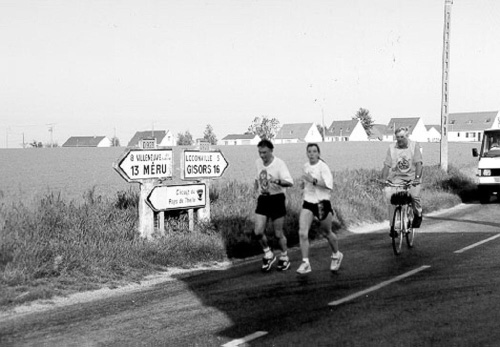
Only 13K to go on my 176 mile run to France in 1992
Chapter Ten: Olympic Disappointment
Back home I did get back into winning ways within three days, when I won a three mile race in 13:48, running for Berkshire against the Army and the Universities Athletic Union. On the Saturday at the end of an eventful week, I retained both my Police National titles, winning the one mile in 4:14.3 and the three mile in 13:56.4.
I was signed up by the
Reading Standard
to write a column every two weeks in the build-up to the Olympics, and my first article was published on May 13
th
1960.
The week after the Police Champs, it was the AAA Championships at the White City that were to be the main selection races for the Olympic team. In hindsight I was silly and ran both the six miles on the Friday evening, where I came fourth in 28:19.8, and the three miles on the Saturday afternoon, coming fifth in 13:39.4.
When the Olympic team was announced I was not in it, and I was on duty when I found out. I was not happy and telephoned Jack Crump at AAA's headquarters from a telephone box on my beat. He was very sympathetic and explained that it had been a hard decision, which had been discussed at some length by the Board, but that at the end of the day they thought that my problem with hot weather and my more recent health problem would prevent me from performing at anything close to my potential. He was quick to make me an offer, which did not make up for the disappointment of missing the Olympics, but was still acceptable. He promised me that I would be given the opportunity to go on any overseas trips that would come up after the Olympics.
I was told that I could still make the team if I performed well at a meeting in Glasgow at the beginning of August; and so, only a couple of days after my second child and first son was born, Jonathan Stanley, I was off on my travels again. The meeting was the Glasgow Rangers annual meeting at Hampden Park on 6
th
August. It was very hot and not ideal weather for me to prove myself to the selectors, but I was determined to grab my place by winning the three mile race. I had a good race and on the last lap I made sure by outsprinting my two nearest rivals, Alistair Wood the Scottish record holder at the distance, and Martin Hyman who was going to the Olympics in the 10,000 metres. My winning time was 13:39.6, not a fantastic time but I had won a tough race in my least favourite conditions, and thought as I crossed the line that I had my ticket for Rome. It was not to be, and when the final few places were filled I was not selected, and Gordon Pirie got both the 5,000 and 10,000 metres slots.
I flew home to see my one-week-old son, and within forty-eight hours I was running at North Shields in a two mile race, which I won in 8:49, the second fastest time of the season by a UK athlete, and beating John Anderson who was a selected runner for the Olympic 1,500 metres, so I was in reasonable form.
Other races in August included second place in an invitation 5,000 metres with 14:9.8, which was not very good but by then my Olympic dream had been smashed. I also got second in the annual London Fire Brigade meet at the White City, with 8:52.2.
I then had a month off racing and just trained modestly until the Welsh Games in Cardiff in the middle of September. On a wet and windy day, with a very soggy track, I had a very close race with Lazlo Tabori (exiled Hungarian), Dave Power (Australia) and Nyandeka (Kenya). At the bell, the four of us were running abreast, until Tabori took off with me chasing him, and it was a
tremendous race up the home
straight
(a quote from the papers), and Tabori just got up to win by two yards with me taking second place, both with the same time of 13:49, and the Kenyan taking third place.
My racing programme started to warm up again, and four days after Cardiff I was second again in the Air Ministry Sports two miles in 8:55.8, followed three days later with a win over three miles at Welwyn Garden City in 13:43.8. The winning habit did not last, and four days later I could only finish fourth in the three miles, in a match between London and the Pan American Cities.
Jack Crump kept his word, and in October I was off to the West African Games in Lagos, Nigeria. This was an interesting and historical trip. The event was to be part of the celebration of Nigerian Independence, and the team was an international one, made up of mainly athletes who had attended, and in many cases won medals in the Olympics in Rome. The team included Americans, Commonwealth athletes and two or three of us from the UK.
Our first problem on the trip occurred in the air while we were flying across the Sahara to Lagos. Most of those on board the BOAC plane were asleep when we were awoken by the air stewards and told there was a problem with the plane; apparently the hydraulics had gone and there were no brakes or controls. As we flew south I remember seeing the camel trains going across the desert; it was a different world. We landed safely at Karno, an airport in the north of Nigeria, and had to stay there until the plane was fixed. By coincidence, forty years later, I was talking to my colleague in the Sports Aid office about the incident, and she knew all about it. She had been working at Heathrow at the time, and was responsible for despatching the aircraft engineers to Karno - a small world!
We did eventually fly on to Lagos, and were taken from the airport to the Games âVillage'. This was also a bit of a shock, especially for the team management and the girls on the trip. Our housing was concrete built units with no windows or doors. There were the most basic of facilities and we all had our mosquito net. The Nigerians had no intention of separating the sexes, but the women's team management had other ideas. They quickly decided that their girls could not stay in the same buildings as the rest of us, and before we knew it they had whisked the girls away to stay in a very nice area of large houses some way away from the rest of us. In the same area was a very nice hotel with a swimming pool, and every day we met up at this hotel to have a swim and to eat. I spent many happy hours in the pool with girls like Betty Cuthbert from Australia, the Olympic gold medallist sprinter, who sadly was at the opening ceremony at Sydney 2000 in a wheelchair. It was just as well that we had this special arrangement for eating, as the only other eating facility was back at the village where we shared the eating facilities with the local villagers.
The first morning we all made our way to this communal facility. It was a long building, open to the sky in the centre, and flowing through it was a trough or trench, and obviously food was thrown in there. It was open to the skies, so that when it rained it would be washed through. There was a long queue of the locals waiting to be served with breakfast. There was a huge black pot, similar to the cartoon type that missionaries were cooked in, and porridge was being cooked in large quantities. Fortunately there were cereals, which I think may have gone out with us, and we all opted for the âsafe' food.
Once we got used to our living environment, and the lizards running in and out of our ârooms', it became tolerable. The organisers had a fleet of Mercedes cars and VW minibuses to take us and other VIPs about. They were driven by boys from the bush, who had literally been given a few minutes' instruction and then given their vehicle to drive. We had some hair-raising journeys, but in a few days they did grasp the rudiments of driving on the mud-made and very bumpy roads.
The whole team was taken to the stadium for the opening ceremony. There was a decent track, but the stands were mostly temporary, made from scaffolding. We lined up and marched into the stadium where we were announced as the team from the Commonwealth. This did not go down too well with the large number of American athletes, although most of them saw the funny side. The prime minister of the new emerging country was there to welcome us, but sadly within six months he was murdered when the inter-regional fighting started.
The fun really started when the athletics commenced. They did not have the right implements. They had a sledgehammer for hammer throwing, and there was no water jump for the steeplechase, which was to be one of my two events in the match. The meeting was very basic, but there was some good competition. The African nations were just emerging in sport and their inexperience was very evident. It seems a lifetime away from today when they dominate so much of athletics and other sports.
On the Friday, the first day, I ran in the 1,500 metres and came fourth in 3:54. A couple of the Africans had got in front of me as well as one of our team.
The next day it was the 5,000 metres and it was very hot. I ran with Max Truex, the US 10,000 metre champion and record holder for most of the race until he left me. I came second in 14:32.4, a very slow time, but we got the maximum points for the team.
I remember the actual handover ceremony that took place at midnight on 5
th
October 1960. Princess Alexandra was there to represent the Queen and I remember the Union flag being lowered and the Nigerian flag being raised to symbolise the changeover.
We were invited on board the warship that the Princess was staying on, and we were given passes and told to make our own way to the dockside where we would be taken on board. For some reason I made my way on my own and I will not forget the crowd, or what happened, when I arrived. There was a massive crowd between me and where I was going, so I showed my pass to a police superintendent and he immediately took action to get me through the crowd. He just walked through waving his swagger stick and hitting anyone who got in our way. There were barriers to keep the crowd contained and some people were trying to climb over them; down came his stick on their hands. I tried to stop him but it seemed that this was the expected police method of keeping control in Nigeria. I could not help thinking that there were times back home when I could have used such tactics, but rest assured this was not a serious thought.
My writing continued, and while I was in Nigeria the Wolfenden Report on Sport was published, and I sent my comments on the report to the paper.
A week after my return to England, I was selected to run against the East Germans in Berlin. It was the end of a long and rather disappointing season, but I decided I would take the trip because it was a little different. This was an interesting trip as it meant flying into Berlin, which was in the Eastern Sector of the city, and it was before the âWall' was built between East and West. We were to stay in the East and to compete there, but we did explore, and although there were armed guards on the border in the city, we ignored them and walked over into West Berlin. I remember the contrast was tremendous, with the new buildings and neon signs in the West, and the dereliction with bombed buildings still standing in the East. There was a great contrast in the people as well, with the Western Berliners smartly dressed and in bright clothes, and the Eastern people were drab and poorly dressed.
I ran the 5,000 metres, but only came third in 14:20; a very disappointing end to a disastrous season that could have been my greatest.
By now it was the middle of October, and into the period where I normally cut down on training and enjoyed the occasional race. For a few weeks my training did drop right down, and one week only had a total of sixteen miles in my training diary.
The last Saturday in October put me back into winning mood with a cross-country win over six miles in an inter-club race. Another win followed in an inter-police force race, and then it was off to the Le Soir race in Brussels.
This was one of the attractive races of the winter season, because there were good prizes and the runners were always well looked after. It was also an interesting and different event, because there was the
Criterium des Arcs
for the elite runners, but there was also several other races including a club race where there were thousands of runners. This was unique in those days, as there were no mass running events that we have come to see in the 1980s and beyond. I only finished fourteenth in Brussels, with a time of 32:46, for a distance of just over 9,000 metres or about 5.5 miles.
Back home I did manage to win four more races before Christmas, and my training crept back up to nearly seventy miles a week.
The New Year started off with my annual visit to South Wales and the Nos Galan races at Mountain Ash. I ran in the one mile again in the afternoon, which was won by Derek Ibbotson in 4:16.8, and then I lined up for the 3 mile 1,600 yard midnight race around the terraces of the town. As usual the race was started by the Mystery Runner, who was the winner of the afternoon one mile, Ibbotson. My main rival on this occasion turned out to be Martin Hyman, and as we came down onto the main street he was just ahead, and he maintained his lead through to where we turned right onto the bridge that would take us to the finish in front of the Town Hall. As we turned onto the bridge the crowd was so dense we had difficulty in making our way to the finish. I suppose I was less of a gentleman than Martin, and I fought my way through the crowd and arrived at the finish first. In one respect I suppose I was a gentleman as I refused to accept the win, and insisted that the winner's sash went to Martin Hyman because without the crowd he would genuinely have won by twenty metres or so. My time was 18:37, which was twelve seconds faster than in the previous year and it was in fact the fastest time I was ever going to achieve at Nos Galan over the years. Because of the crowds, the rest of the runners were allowed to finish on the other side of the bridge to avoid any further disputes.
Back in Berkshire I did manage to win the Berkshire title yet again.
Around this time I had started to teach Marion to drive, and on Friday, 13
th
January 1961, while we were having a short drive very close to our home, she took a corner too wide at the same time as a biscuit lorry was also over the white line in the middle of the road. We collided and the car was thrown some way up the road, and the lorry ended up in the ditch. The car had spun around and I was thrown out onto the road, landing on my head. We had our two young children in the car; baby Jonathan was in his carrycot on the back seat and narrowly missed being hit by the fire extinguisher that fell off the back shelf, and Caroline, who had been sitting on my lap, came out of the car with me. Fortunately I hit the ground and she didn't. There were no seat belts in those days. Marion was taken to hospital but did not have any serious injuries, which was surprising when we later saw the damage to the car which was a write-off.